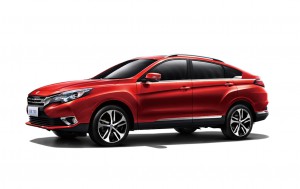
Nissan and Dongfeng are counting on growing sales of its low-cost Venucia brand in China to push Nissan past 2.5 million units by 2022.
Through its alliance with Renault and Mitsubishi, Nissan may be the best-selling vehicle company in the world, but it still lags General Motors and Volkswagen in China. However, it’s got a $9.5 billion plan to change that.
Nissan executives want to raise its sales by more than 1 million vehicles by 2022 through a mix of new entries, including EVs, and growth of its luxury and low-cost indigenous brands, Infiniti and Venucia, respectively.
The move comes in what can be considered a weak sales market in China right now. The country’s auto sales stalled in December and ended 2017 up a meager 1.4% compared with a year ago results, according to the China Association of Automobile Manufacturers. Sales in 2016 were up 15% compared to 2015.
Top sellers General Motors, BMW, Volkswagen AG, Mercedes-Benz, Toyota and Nissan all reported solid, but not spectacular, gains during 2017, smaller local brands common to almost every province and international brands such Ford and Hyundai, appeared to suffer the most for the slowdown, which was due in part to the end of special tax credits.
With that as the backdrop, Nissan and its Chinese partner, Dongfeng Group, plan to increase sales to 2.6 million vehicles a year by 2022, up from 1.5 million vehicles last year, using the strategy is calls the “Triple One” gambit. Focusing on EVs and the Venucia brand is critical because they have the most room for growth. It also wants to boost sales of light commercial vans and trucks.
(China posts meager 1.4% sales increase in 2017. Click Here for the story.)
While the 2.6 million won’t put Nissan on par with GM and VW, each sells more than 4 million vehicles annually, it will help them separate from the group following the leaders, Toyota Motor Corp., Ford Motor Co., and Honda Motor Co., which sell about 1 million-plus vehicles annually.
“We aim to break away from this second-tier group and become a top-three China automaker,” Nissan’s China chief Jun Seki said in an interview with Reuters.
The plan is pretty straightforward. Nissan and Dongfeng want to grow Nissan brand’s annual sales by 500,000 vehicles to 1.6 million vehicles a year as well as Infiniti’s annual sales by 100,000 vehicles to about 150,000 vehicles a year by 2022.
Electric vehicles play a critical role in the 2.6 million vehicle target, especially since the government is still looking for more electric vehicles for its large cities. Seki told Reuters the joint venture will launch as many as 20 electrified vehicle models across all brands in an effort to sell roughly 700,000 such cars a year by 2022 excluding electric light commercial vehicles.
The jump to 700,000 is a big one considering that Nissan and Dongfeng sold just 22,000 EVs last year, most of those light commercial vans. were using a combination of all-electric battery vehicles and so-called “e-Power” hybrids.
(Click Here for details about China banning production of 553 models.)
To bolster sales, Nissan will develop low-cost EVs that run on locally produced motors and other components. In order to generate large enough EV volume, Nissan plans to come up with lower-cost electric cars by locally sourcing electric motors and other key EV components from suppliers in China and selling them through the aforementioned Venucia brand, which has been around since 2012.
Venucia, which uses old Nissan platforms and transmissions, sold 143,000 vehicles, up 22.7% from 2016. The goal, according to Seki, is to get that up to 600,000 by 2022. “Venucia is our clear advantage and we are going to milk it to grow rapidly,” Seki said to Reuters.
While the plan is simple, getting the results won’t be. Like Nissan, Ford, Toyota and Honda have all expressed similar desires to increase their China sales during the next five years, especially in the electric vehicle sector.
Additionally, it’s not as if the leaders aren’t looking to increase that lead. VW announced in November it will spend $11.8 billion by 2025 to develop and manufacture all-electric and plug-in hybrid vehicles for China.
(China seeks to add AI to 50% of vehicles by 2020. Click Here for the story.)
Ford Motor Co. announced plans last month to roll out at least 15 new electrics in China by 2025. GM previously announced plans to start production of a pure-electric vehicle in China and launch 10 electric or gasoline-electric hybrids by 2020.
